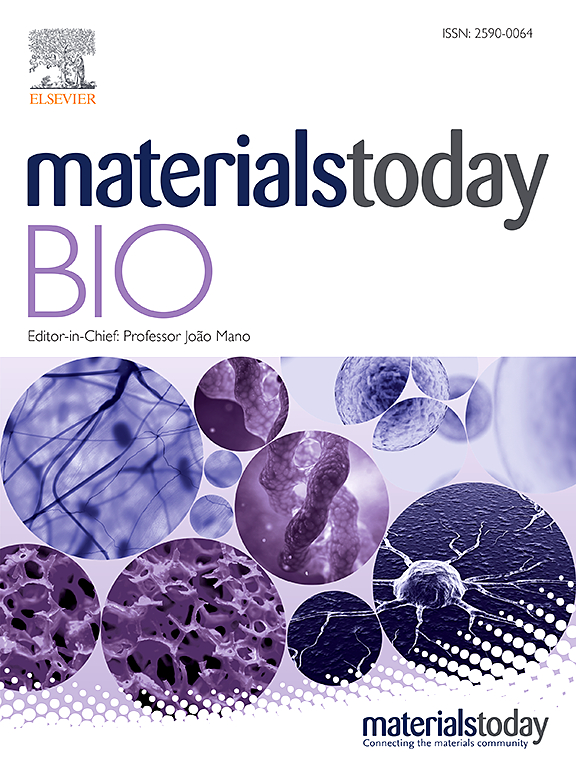白藜芦醇负载工程微胶囊与双抗菌和活性氧清除程序性伤口愈合
IF 8.7
1区 医学
Q1 ENGINEERING, BIOMEDICAL
引用次数: 0
摘要
水凝胶微粒已被证明对皮肤伤口的修复是有效的。该领域的尝试主要集中在如何丰富结构和封装生物活性物质,以实现空间可控释放,加速伤口愈合。在此,我们提出了一种新型的核壳微胶囊递送系统,其空间封装和释放白藜芦醇(RSV)和壳聚糖(CS)来治疗感染伤口。这种微胶囊(ALG-CS)是通过微流控电喷雾技术制备的,其内核包裹RSV,外层覆盖亚胺键交联CS水凝胶。所设计的CS水凝胶涂层可以提高微胶囊的稳定性,进一步防止RSV的过早泄漏。CS水凝胶层在酸性环境中逐渐降解,并伴随RSV的释放,使得微胶囊的抗菌性能增强。此外,释放的RSV在体外表现出出色的抗氧化能力,保护细胞免受氧化应激。因此,我们将获得的负载rsv的ALG-CS微胶囊应用于金黄色葡萄球菌感染的伤口床上,证明了这种微胶囊具有显著的加速伤口愈合作用,减轻氧化应激,消除细菌感染,降低炎症反应,促进胶原沉积和血管生成。这表明微胶囊给药系统在细菌感染的伤口治疗中具有重要的应用价值。本文章由计算机程序翻译,如有差异,请以英文原文为准。
Resveratrol-loaded engineered microcapsules with dual antimicrobial and ROS-scavenging for programmed wound healing
Hydrogel microparticles have been proved effective for the skin wound repair. Attempts in this area focus on how to enrich the structures and encapsulate bioactive substances to achieve the spatially controllable release for accelerated wound healing. Here, we propose a novel core-shell microcapsule delivery system with the spatial encapsulation and release of resveratrol (RSV) and chitosan (CS) to treat infected wounds. Such microcapsules (ALG-CS) were generated through microfluidic electrospray technology, with the inner core encapsulating RSV and outer layer covered with the imine bond-crosslinked CS hydrogel. The designed CS hydrogel coating can improve the stability of microcapsules and further prevent the premature leakage of RSV. The gradually degraded CS hydrogel layer in acidic environment accompanied with the subsequent release RSV contributed to the enhanced antibacterial properties of the microcapsules. In addition, the released RSV exhibited outstanding antioxidant capacities to protect cells from oxidative stress in vitro. Thus, by applying the obtained RSV-loaded ALG-CS microcapsules onto the S. aureus-infected wound beds, we have demonstrated that such microcapsules showed significant accelerated wound healing effects with alleviated oxidative stress, eliminated bacterial infection, down-regulated inflammatory response, and promoted collagen deposition and angiogenesis. These indicated that the microcapsule delivery systems are valuable for bacteria-infected wound therapy.
求助全文
通过发布文献求助,成功后即可免费获取论文全文。
去求助
来源期刊

Materials Today Bio
Multiple-
CiteScore
8.30
自引率
4.90%
发文量
303
审稿时长
30 days
期刊介绍:
Materials Today Bio is a multidisciplinary journal that specializes in the intersection between biology and materials science, chemistry, physics, engineering, and medicine. It covers various aspects such as the design and assembly of new structures, their interaction with biological systems, functionalization, bioimaging, therapies, and diagnostics in healthcare. The journal aims to showcase the most significant advancements and discoveries in this field. As part of the Materials Today family, Materials Today Bio provides rigorous peer review, quick decision-making, and high visibility for authors. It is indexed in Scopus, PubMed Central, Emerging Sources, Citation Index (ESCI), and Directory of Open Access Journals (DOAJ).
 求助内容:
求助内容: 应助结果提醒方式:
应助结果提醒方式:


